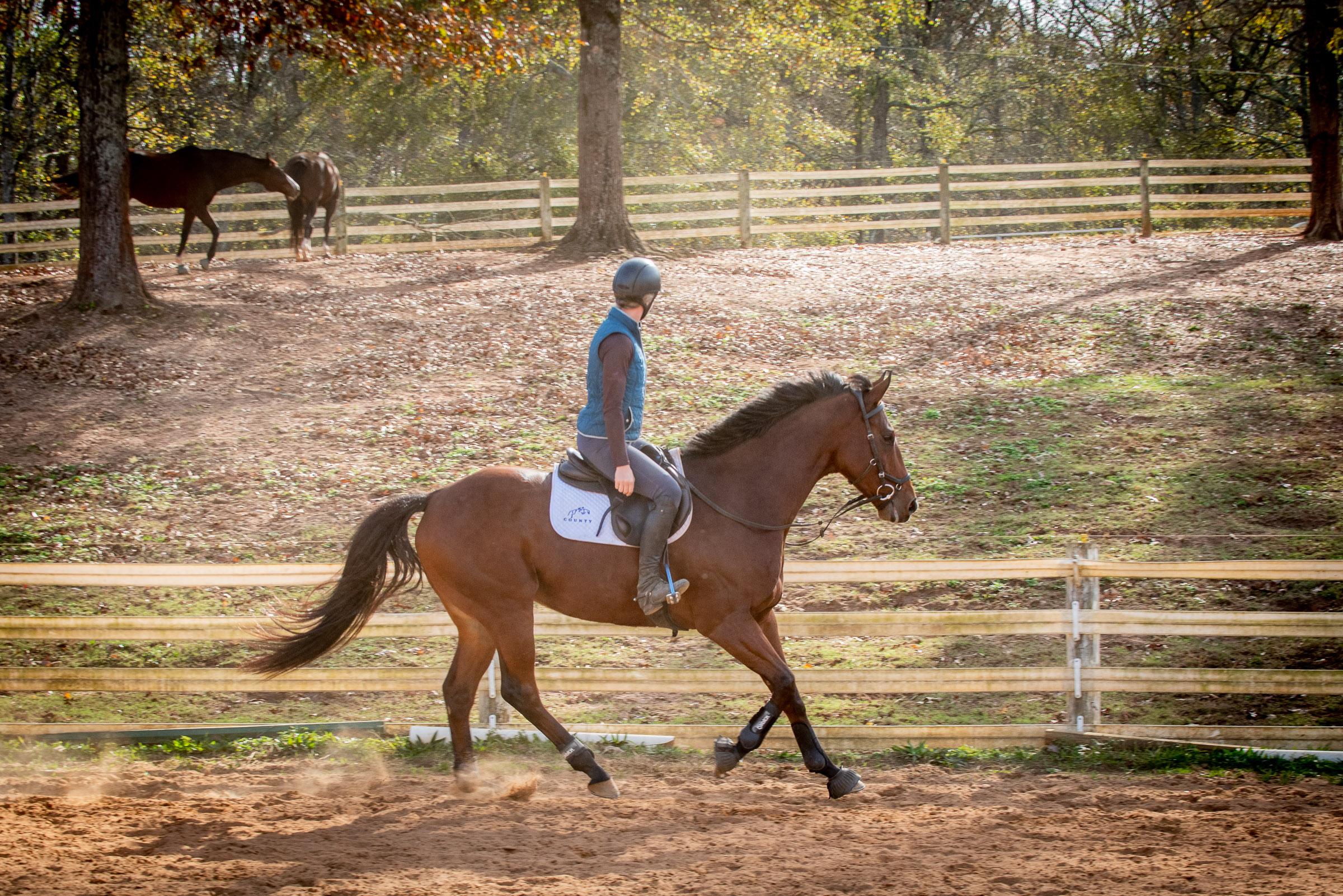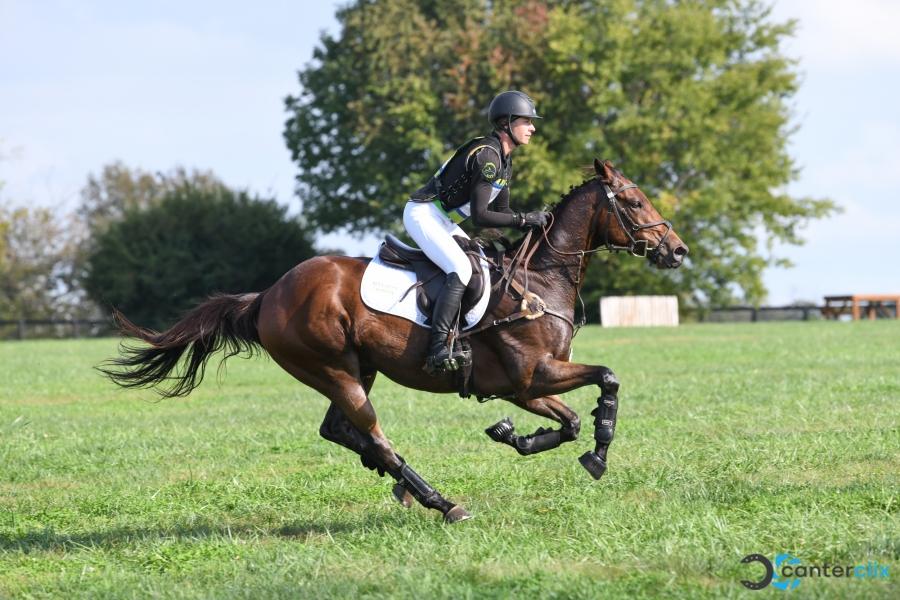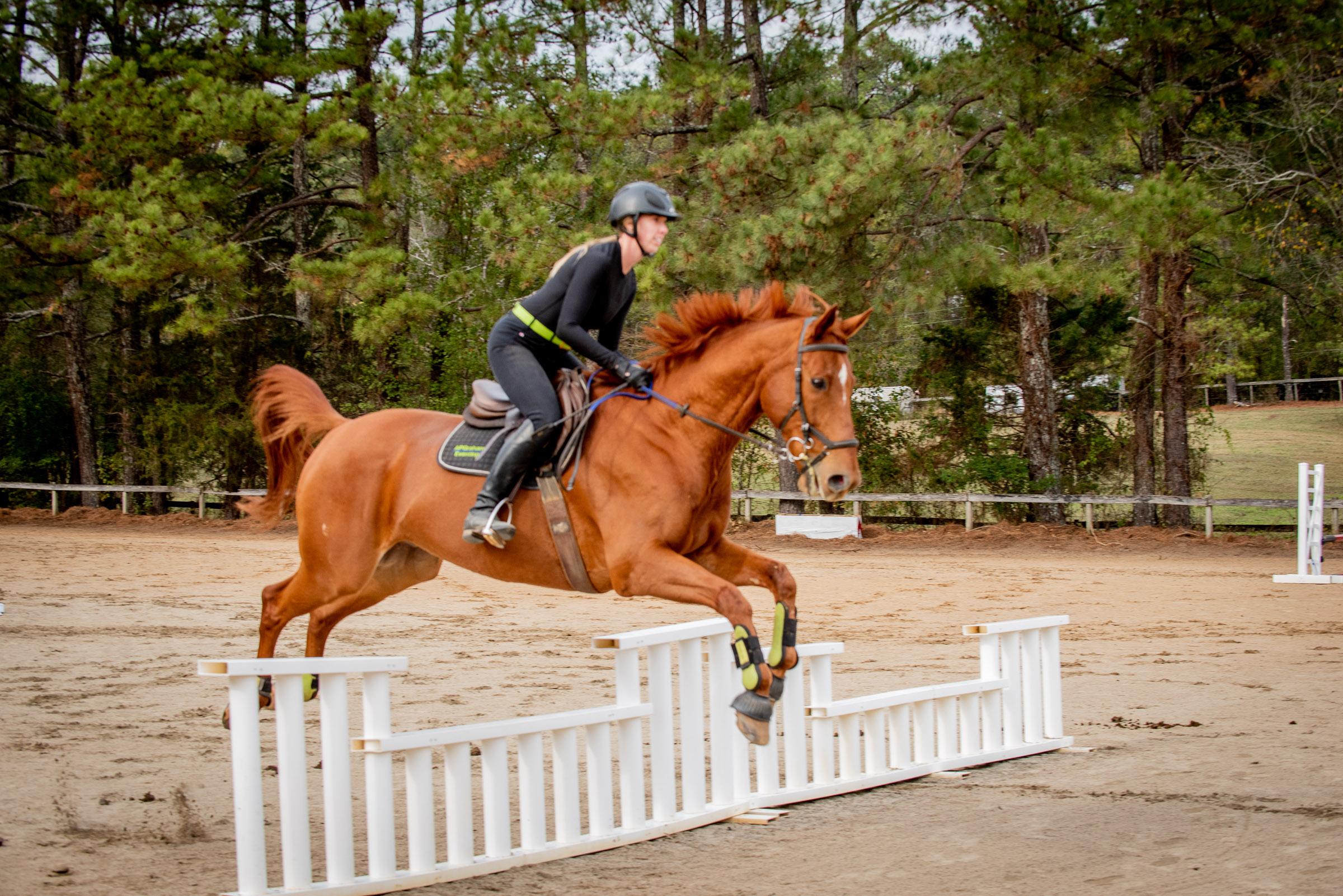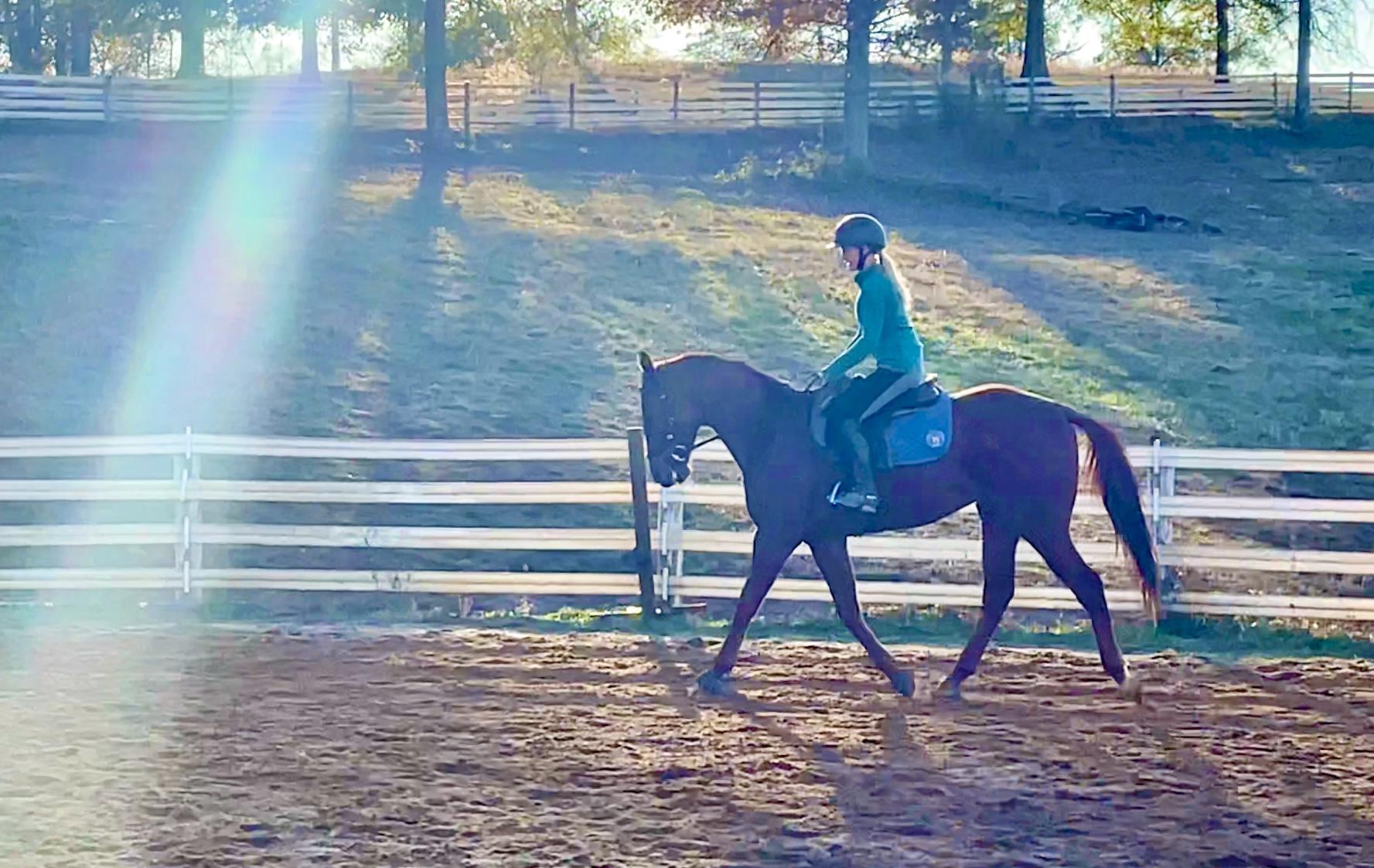
Thoroughbred Logic: Thankful for the Thoroughbred
“… each time I swing my leg over a Thoroughbred, I am grateful that, in fact, that is exactly what I am riding.”
Welcome to the next installment of Thoroughbred Logic. In this weekly series, Anthropologist and trainer Aubrey Graham, of Kivu Sport Horses, offers insight and training experience when it comes to working with Thoroughbreds (although much will apply to all breeds). This week Aubrey discusses some of the many reasons she is thankful for the Thoroughbred.
It is that time of year when we all reflect on (and post about) how thankful we are for all we have. And while the nights come earlier this time of year and everyone struggles to get the rides in, each time I swing my leg over a Thoroughbred, I am grateful that, in fact, that is exactly what I am riding.

Crafty Charger back at it after over a year off. I love riding Thoroughbreds, but sometimes, I love riding this one most of all. Photo by Katie Stewart.
Here’s a short list of why I’m so emphatically grateful to ride (and have a barn full of) Thoroughbreds:
I’m grateful for their smarts.
Yep, the brain on these horses can’t be matched. Given the chance, they are all capable of learning to respond, not just react. They can size up a situation, a jump, a slippery hill on cross country or another human and figure out the best way to handle them. With Thoroughbreds, it is never a one-size-fits-all response. As such, you might have to be on top of your game… But, if you can figure them out, you’re guaranteed not just a solid riding horse, but a partner.

Monk (Sydster) is a very bright horse — and I have no doubt that given some time, he’ll make a hell of a partner. Photo by Kelly Robison.
I’m grateful for their personalities.
They might show up from the track all professional and subdued, but give these kiddos a week here and suddenly they’re licking the whisky barrels, playing tug of war with the lead ropes and their friends, requesting that you scratch their tongues (ahem, Crafty, you weirdo), and begging for attention in all their own ways. I love watching these personalities and goofy traits emerge as they settle in and realize that my random barn of misfit toys can absolutely support another odd duck…

Gumbo (Bayou Prospector) and I apparently share a similar palate — though I prefer what is inside the barrels. Photo by author.
I’m grateful for their trainability.
This is in part due to the fact that they are smart AND that they want to please. Their huge try and overwhelming desire to get it right might produce anxiety on the flip-side, but it is exactly that trait that makes them so quick to learn — and to figure out how to apply what you are asking. Be kind and clear and these kids will do their best to get it right every time — not just because you said to, but because they want to. Now, my pig on the other hand: super smart, but unlike the ponies, he doesn’t give a damn what you think…unless you have peppermints.

Successful racehorse, Quality Step, makes the retraining process really, ridiculously simple. Photo by Kelly Robison.
I’m grateful for their speed.
There’s no beating around the bush here — there’s nothing like getting on a horse that has a solid gas pedal and gears that I probably will never reach. I’m grateful for how it feels when I can hop in a half seat and cover a half a mile of field at their breezing speed. I’m grateful, therefore, to know that in general, I won’t struggle with making time on course. And better yet, when the course is long, and the jumps have been tough, these OTTBs always have a little bit left in the tank to gallop you over the line with their ears up.

Rhodie (Western Ridge) burning up the “show gallop” at the 2021 Retired Racehorse Project’s Thoroughbred Makeover. Photo by Canter Clix.
I’m grateful for their kindness.
Kindness is a hard concept to describe. It is at once patience and connection and then some components that I am not sure we have words for in English. From the other side, I am grateful for the horses who are slow to anger, patient (though they might keep their feet moving) when needed, and eager to connect. More than that though, they are able to understand how you are doing sometimes better than you do. I miss Mountain most for this. His quiet, goofy ability to sense a need and fill it with his gentle attention remains unmatched — head in your lap, ears buried under your chin for as long as required.

Forrest (Don’t Noc It) and Walker at the debut Miss Priss Jumper Show in Covington, GA. Photo by Amanda Woomer.
I’m grateful for their versatility.
Oh you want to run a three phase tomorrow? Fox hunt on Sunday, and sort cows on Tuesday? Okay. Throw in a little polo and some barrels, dressage, and a trail ride. Why not? They can do it all. They might be purpose-bred to run, but the combination of the ultimate athlete, their try and smarts, and they can literally learn to do it all. On that note, only Forrest came when I called the other day, leaving the other three in his field nearly a 1/3 a mile away. So I swung up on top of his blanket and galloped off to wrangle the other boys down from the top of the field. I might suck at that job and only managed to entice one horse to come back with us, but that former runner and current low-level eventer could absolutely work a ranch.

Forrest (Don’t Noc It) also showing off his skills with different riders and hopping around the Miss Priss jumper show with Anna Sasser in the irons. Good Llama. Photo by author.
I’m grateful for their careful bravery.
There is no other breed that I am more comfortable on when the chips are down… or when getting around a challenging cross country course. If I have them straight and keep my leg on, I’m (pretty sure) they will jump — and be clear. If I miss a stride or the footing changes, I know they’ll add the half stride and still find their way to the other side. I love how they process new objects and experiences. They might side-eye the whisky barrels (newest jump in the ring) when they walk down in hand, but they don’t hesitate when they get asked to hop across them. And when the wind is whipping and the temperature dropping, or when the rain is driving down, I know they’ll harness that bravery and that try and get us both home safe.

Louis (Unbridled Bayou) during a deluge a Poplar Place Farms earlier this year. Photo by Kimberwick Visuals.
I’m grateful for their honesty.
These horses aren’t going to fake it. If you haven’t earned their respect, or if you haven’t asked clearly enough, they’ll let you know. Hold them to the bad distance and they’ll try — they’ll give it a shot. Get it right, soften your inside rein and keep leg and outside rein on, and they’ll give you the shape you’re asking for. Each horse will go a little different with each rider, honestly reflecting their ability, their seat, their mood and their anxiety level. And while that sensitivity and honesty can be frustrating on a bad day, it makes it so much more worthwhile when it goes right — because at that point, you know that you have put all of your pieces together correctly as well.

Alanah Giltmier and Snaps (Mr. KW) slowly and correctly putting the pieces together and watching his wonderfully honest responses. Photo by author.
And while I could keep this list going for days, I’ll tie it up with this:
I’m grateful for their heart.
Heart, like kindness, does not come with a simple, pithy commentary. Heart is about being able to dig down deep on the backstretch, it is about not giving up on the rider when there are mere fumes in the tank, heart is the try that will surface time and time and time again during a training session. Heart is the desire to connect, to please, and to commit their 1200-pounds of sheer athletic ability to a goal and not just ‘do it’ — whatever it is — but to ‘want to do it.’
Heart is what makes a Thoroughbred.
And I am so grateful for each of them: Bad-ass cross-country machines, barrel-lickers, and all.





